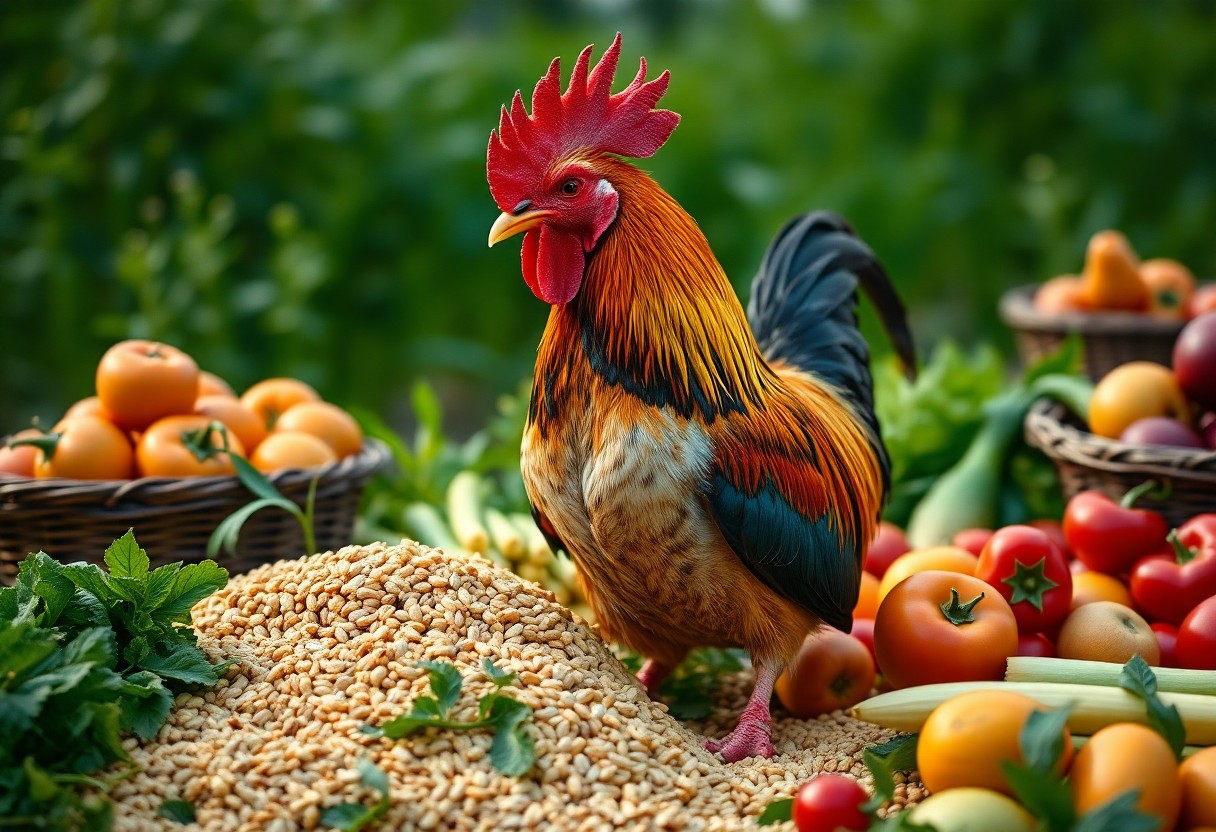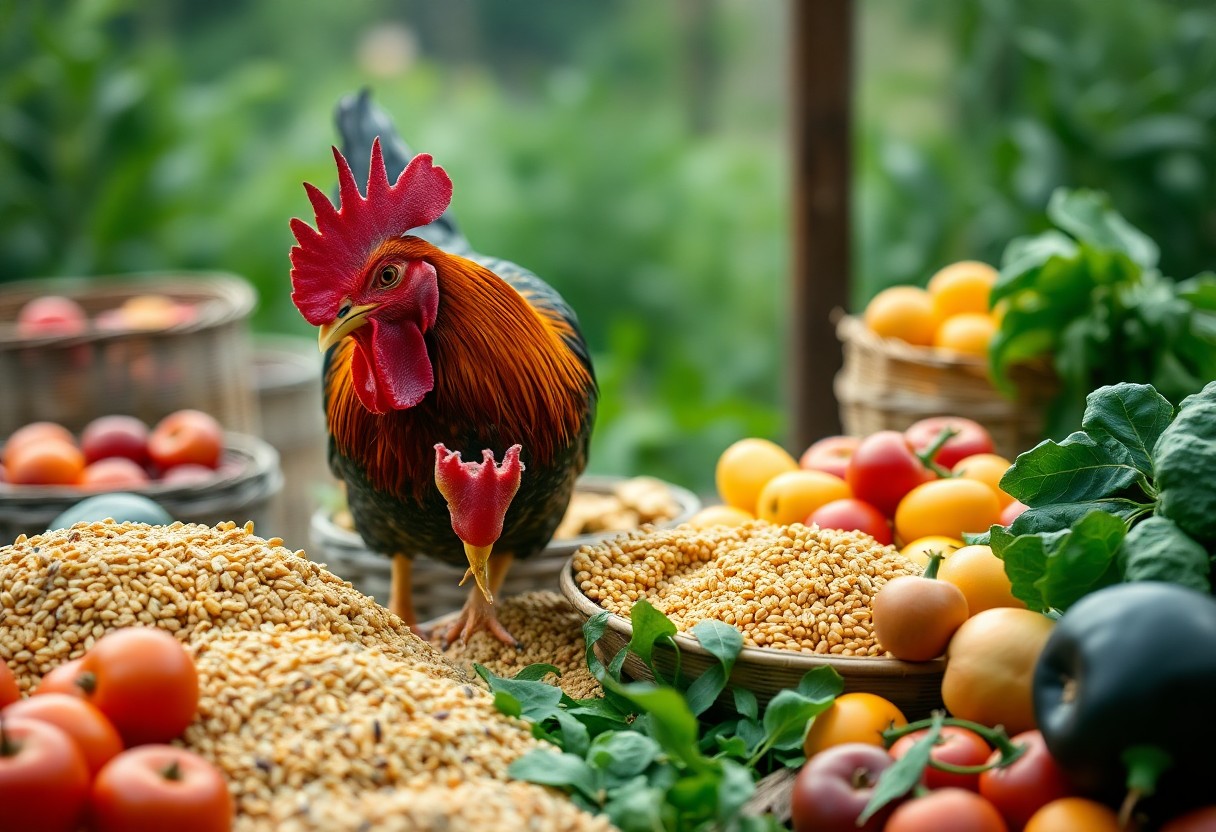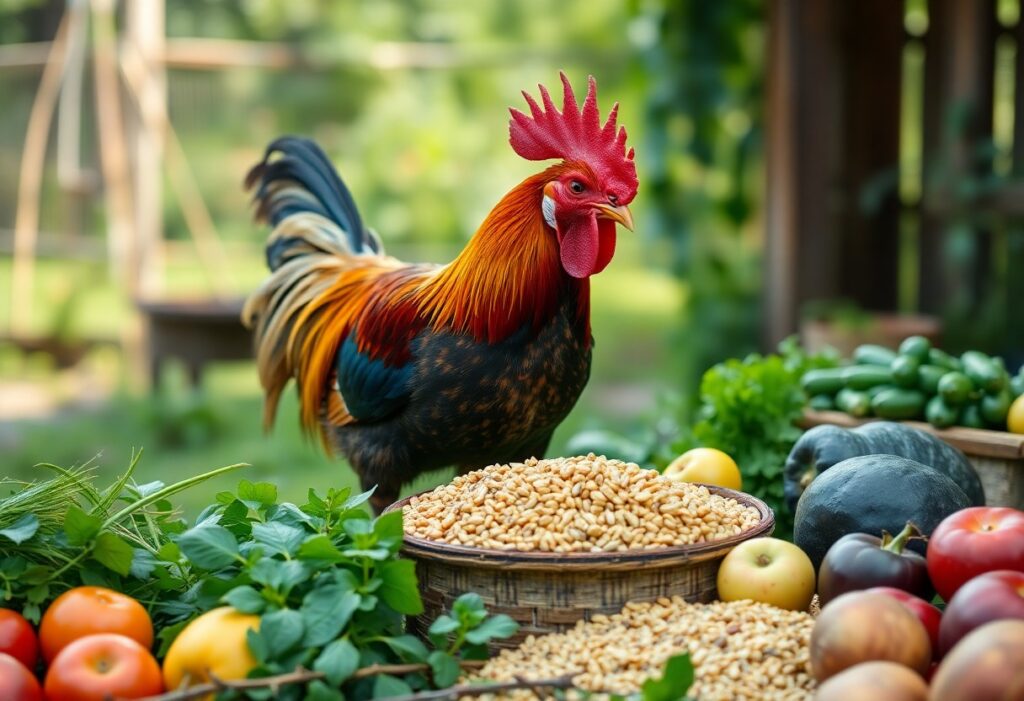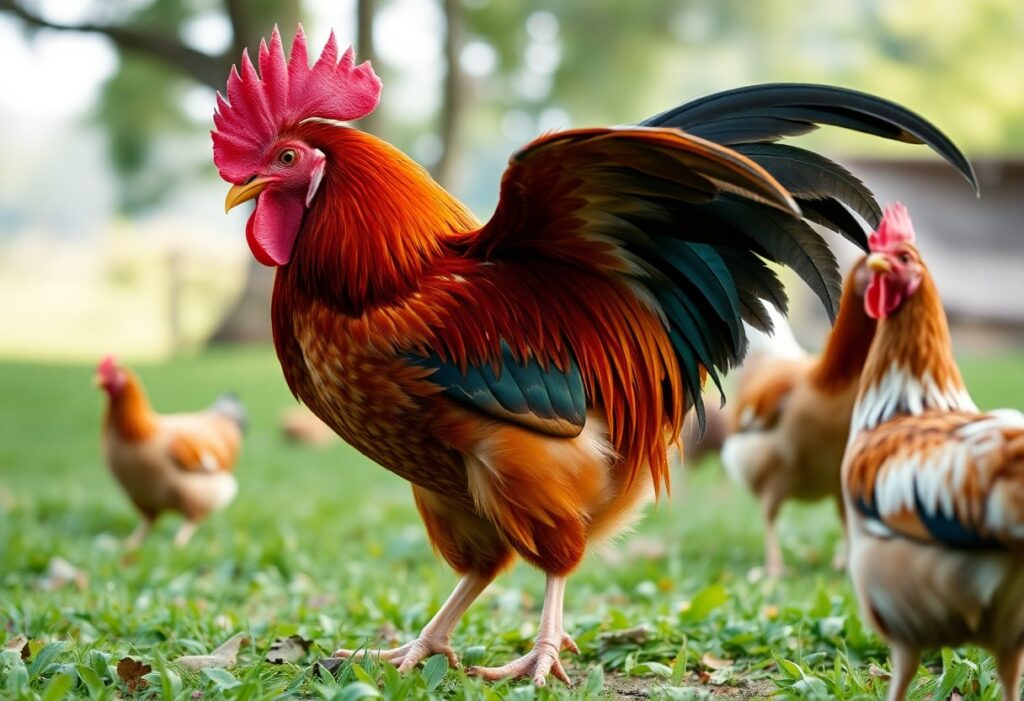There’s no denying that providing your rooster with a well-balanced diet is imperative for their overall health and vitality. As a keeper, you play a vital role in ensuring your feathered friend receives the necessary nutrients to thrive. This means understanding the key components of their diet, such as proteins, vitamins, and minerals, which contribute to their strong immune system, *optimal growth*, and *reproductive performance*. In this post, you will discover the fundamental nutrients to maintain your rooster’s lifelong health.
Key Takeaways:
- Roosters require a blend of proteins, vitamins, and minerals to maintain optimal health, ensuring they have a balanced source of nutrients in their diet.
- High-quality grains, seeds, and legumes should be incorporated to provide vital amino acids and energy for growth and vitality.
- Supplementing their diet with greens, fruits, and probiotics can enhance digestion, boost immunity, and contribute to overall well-being.


The Importance of Nutrition in Roosters
While many people might underestimate the role of nutrition in a rooster’s health, it is a vital factor that can significantly affect their overall well-being and longevity. Providing your rooster with a balanced diet ensures not only robust physical health but also optimal behavior and reproduction. Understanding the specific nutritional needs of your rooster can lead to healthier birds and a more productive flock.
Overview of Nutritional Needs
Around 16-20% protein is important for adult roosters, along with a proper balance of carbohydrates, fats, vitamins, and minerals. You should provide a mix of grains, seeds, and vegetables to meet these needs, ensuring your rooster obtains sufficient nutrients for energy and body maintenance. A well-rounded diet will promote stronger immune responses and better overall health.
Impact of Diet on Health and Behavior
Nutrition plays an invaluable role in shaping your rooster’s health and behavior. A well-nourished rooster is likely to exhibit more energy, better temperament, and greater vitality.
Indeed, a diet lacking in important nutrients can lead to serious health issues, such as weakness or aggression. Inadequate protein can result in poor feather quality and insufficient energy levels, while an imbalance of vitamins and minerals may cause deficiencies that affect behavior and reproduction. By ensuring your rooster receives a diversified and balanced diet, you will enhance its health, reduce stress, and improve overall flock management.

Key Nutrients for Roosters
Even the strongest roosters require a well-rounded diet to flourish throughout their lives. Key nutrients play a vital role in maintaining their health and ensuring they thrive in their environment. A balanced diet that includes proteins, vitamins, and minerals will not only enhance their longevity but also improve their overall vitality, feather quality, and reproductive success.
Proteins
Between 16% to 20% of your rooster’s diet should consist of high-quality proteins. These proteins are vital for muscle development, egg production, and overall body maintenance. Sources of protein include grains, legumes, and animal by-products, which provide the necessary amino acids for optimum health.
Vitamins and Minerals
Below the surface, vitamins and minerals play a significant role in your rooster’s well-being. Essential vitamins like A, D, and E support vision, bone health, and reproduction, while minerals such as calcium and phosphorus are vital for strong bones and eggshell formation.
In fact, deficiencies in vitamins and minerals can lead to serious health issues in your rooster, including poor feathering, weak bones, and reproductive problems. It’s important that you provide a diverse diet rich in natural sources of these nutrients, such as leafy greens, fruits, and specialized poultry feeds. Ensuring your rooster receives a well-balanced intake of vitamins A, D, E, and minerals like calcium and selenium will enhance their immune system and overall vitality, promoting a happier and healthier life.
Balancing Macronutrients
Not achieving a proper balance of macronutrients—carbohydrates, fats, and proteins—can negatively impact your rooster’s health and vitality. It’s crucial to ensure that their diet contains a well-rounded mix of these nutrients so they can thrive, maintain their energy levels, and support overall well-being. Striking this balance allows your rooster to grow optimally and perform at its best.
Carbohydrates
Above all, carbohydrates serve as the primary energy source for your rooster. They are necessary for fueling activities and maintaining metabolic functions. Including healthy grains like corn and oats in your rooster’s diet ensures they have sufficient energy to stay active, grow, and produce eggs.
Fats
With fats playing a vital role in your rooster’s diet, they contribute to energy reserves and help in the absorption of crucial vitamins. Fats also support healthy skin and feather development, promoting an overall vibrant appearance.
For instance, incorporating healthy fats, like those from flaxseed or fish oil, into your rooster’s meals can provide significant benefits. These fats not only enhance energy levels but also improve feather quality and skin health. However, it’s important to avoid excessive saturated and trans fats. Balance in fat intake ensures your rooster remains energetic and healthy while maintaining a shiny coat that reflects their well-being.
Common Dietary Sources
After understanding the key nutrients necessary for your roosters, it’s important to consider the common dietary sources that can provide these imperative elements. A well-rounded diet combines grains, legumes, seeds, and legumes to deliver carbohydrates, protein, and fats. Additionally, green leafy vegetables and fruits can offer necessary vitamins and minerals. By diversifying your rooster’s diet, you ensure that they receive a broad spectrum of nutrients vital for their overall health and longevity.
Commercial Feed Options
Before selecting the right commercial feed for your roosters, assess the nutritional content on the label. High-quality feeds are formulated to cater to the specific needs of poultry, containing a balanced mix of grains, protein sources, and added vitamins and minerals. Look for options specifically designed for roosters, ensuring they receive the right nutrients to support their growth and reproductive health.
Natural Supplements
To enhance your roosters’ diet, consider incorporating natural supplements. These can include items like crushed oyster shells for calcium, garlic for immunity, and fermented foods that support gut health. Adding these supplements can further boost your rooster’s overall health and vitality.
This is especially important as natural supplements can provide additional benefits, such as improved digestion and enhanced egg production. For example, fermented grains can promote gut health, while garlic is known for its antibacterial properties. Just be cautious with the quantities and potential harmful effects of certain supplements; some can be toxic in large amounts or might not suit your specific flock’s needs. Always research and introduce any new supplement gradually to observe how your roosters respond.
Feeding Regimens and Practices
Once again, it’s important to establish a consistent feeding regimen that aligns with your rooster’s nutritional needs. Implementing a structured approach to feeding will ensure your rooster receives the right balance of nutrients. This can include a combination of commercial feed, grains, seeds, and fresh vegetables. Keeping their feeding area clean and maintaining a proper storage solution for feed are imperative practices to avoid contamination and spoilage, ensuring your rooster’s lifelong health.
Portion Control
Above all, portion control is vital to avoid overfeeding your rooster, which can lead to obesity and related health issues. Always provide just the right amount of feed, taking into consideration your rooster’s size, age, and activity level. By carefully monitoring portions, you can help maintain a healthy weight and support your rooster’s overall well-being.
Feeding Frequency
Around two to three feedings per day are generally recommended for your rooster, as this aligns with their natural foraging behavior. Spreading out meals can help keep their energy levels stable throughout the day. It allows your rooster to digest food more effectively and prevents gorging. Additionally, including fresh water at each feeding is imperative. It supports digestion and helps maintain proper hydration, especially during hot weather.
It is beneficial to note that consistency in your feeding schedule can greatly impact your rooster’s health. By feeding your rooster on a routine basis, you can help regulate his metabolism and maintain a healthy digestive system. Avoid sudden changes to feeding times or amounts, as this can lead to stress and digestive upset. Always ensure their feed is high-quality and free of mold or contaminants, as this can lead to severe health problems.
Monitoring Health Through Diet
Now that you understand the importance of a balanced diet for your roosters, it’s important to monitor their health through their diet. Keeping an eye on your roosters’ behavior, appearance, and overall energy levels can provide valuable insights into whether their nutritional needs are being met. By observing these traits, you can make informed adjustments to ensure your roosters thrive and remain healthy.
Signs of Nutritional Deficiencies
Among the most common signs of nutritional deficiencies in roosters are feather abnormalities, lethargy, and poor weight maintenance. If your rooster exhibits any of these symptoms, it may indicate a lack of vital nutrients such as protein, vitamins, or minerals in their diet. Regularly assessing these signs will help you address such deficiencies promptly to maintain your rooster’s health.
Adjusting Diet Based on Health Status
Adjusting your rooster’s diet based on their health status is fundamental to ensuring they receive the right amount of nutrients. If you notice any signs of sickness, lethargy, or abnormal behaviors, reassessing the nutritional content of their feed is important. You should consider increasing vital nutrients and adding supplements tailored specifically to address their health needs.
Monitoring your rooster’s health is key to determining the required dietary adjustments. Factors such as weight loss, poor feathering, or lack of energy may indicate a need for higher levels of protein or vitamins. When adjusting their diet, focus on incorporating high-quality feeds that contain important nutrients while eliminating any low-quality products that could further compromise their health. By ensuring that your roosters receive a balanced diet tailored to their current health status, you promote their overall well-being and longevity.
To wrap up
Summing up, providing your roosters with a balanced diet rich in necessary nutrients is key to ensuring their lifelong health and optimal performance. By focusing on proteins, vitamins, minerals, and the right amount of carbohydrates, you can enhance their vitality and well-being. Always be attentive to their dietary needs, adjusting as necessary to accommodate their age and activity levels. By committing to proper nutrition, you’re not just feeding your roosters; you are fostering a thriving and productive environment for them.
Q: What are the necessary nutrients that should be included in a balanced diet for roosters?
A: A balanced diet for roosters should include proteins, carbohydrates, fats, vitamins, and minerals. Proteins are important for muscle development and overall health, and sources can include grains, legumes, and commercial poultry feed with high protein content. Carbohydrates provide energy, while fats help in the absorption of vitamins. Additionally, necessary vitamins such as A, D, and E, as well as minerals like calcium and phosphorus, are necessary for proper growth and egg production. It’s important to ensure that all of these nutrients are present in appropriate proportions to promote optimal health in roosters.
Q: How can I ensure that my roosters are getting enough vitamins and minerals in their diet?
A: To ensure that roosters receive sufficient vitamins and minerals, choose a high-quality commercial poultry feed specifically formulated for their nutritional needs. Additionally, provide access to fresh greens, fruits, and vegetable scraps, as these can enrich their diet with natural vitamins. Offer crushed oyster shells or mineral supplements to fulfill their calcium requirements, especially if they are also serving as breeding roosters. Regularly monitor their health and adjust their diet as needed, and consult with a veterinarian if you notice any signs of deficiency.
Q: What are some good feeding practices to support the health of roosters?
A: Good feeding practices to support the health of roosters include feeding them a balanced diet that meets their nutritional needs based on their age and purpose (e.g., meat, egg production, or breeding). Provide clean, fresh water at all times to ensure proper hydration. Avoid the use of any spoiled or moldy feed and limit the amount of treats to prevent imbalances in their diet. Additionally, consider free-ranging them, as this allows them to forage for insects and additional nutrients while promoting natural behaviors. Monitoring their body condition regularly can also help identify any dietary adjustments needed for optimal health.











